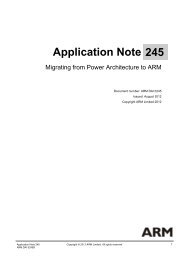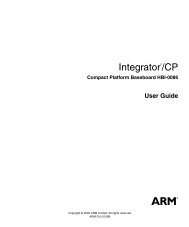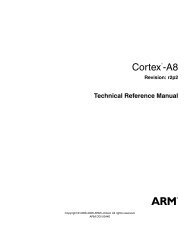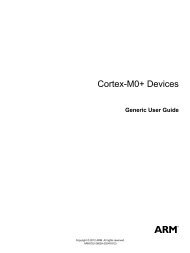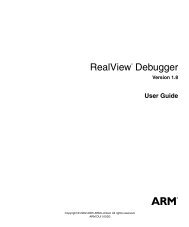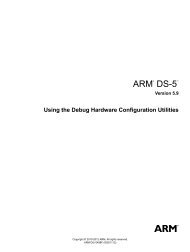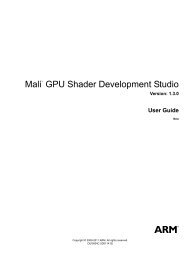ARM Compiler toolchain v4.1 for µVision Using the Compiler
ARM Compiler toolchain v4.1 for µVision Using the Compiler
ARM Compiler toolchain v4.1 for µVision Using the Compiler
Create successful ePaper yourself
Turn your PDF publications into a flip-book with our unique Google optimized e-Paper software.
<strong>Compiler</strong> Coding Practices<br />
Table 5-6 shows <strong>the</strong> corresponding disassembly of <strong>the</strong> machine code produced by <strong>the</strong> compiler<br />
<strong>for</strong> each of <strong>the</strong> sample versions in Table 5-1 on page 5-9, where <strong>the</strong> C code <strong>for</strong> each<br />
implementation has been compiled using <strong>the</strong> option -O2.<br />
Table 5-6 Disassembly <strong>for</strong> nonvolatile and volatile buffer loop<br />
Nonvolatile version of buffer loop<br />
read_stream PROC<br />
LDR r1, |L1.28|<br />
MOV r0, #0<br />
LDR r1, [r1, #0]<br />
|L1.12|<br />
CMP r1, #0<br />
ADDEQ r0, r0, #1<br />
BEQ |L1.12| ; infinite loop<br />
BX lr<br />
ENDP<br />
|L1.28|<br />
DCD ||.data||<br />
AREA ||.data||, DATA, ALIGN=2<br />
buffer_full<br />
DCD 0x00000000<br />
Volatile version of buffer loop<br />
read_stream PROC<br />
LDR r1, |L1.28|<br />
MOV r0, #0<br />
|L1.8|<br />
LDR r2, [r1, #0]; ; buffer_full<br />
CMP r2, #0<br />
ADDEQ r0, r0, #1<br />
BEQ |L1.8|<br />
BX lr<br />
ENDP<br />
|L1.28|<br />
DCD ||.data||<br />
AREA ||.data||, DATA, ALIGN=2<br />
buffer_full<br />
DCD 0x00000000<br />
In <strong>the</strong> disassembly of <strong>the</strong> nonvolatile version of <strong>the</strong> buffer loop in Table 5-6, <strong>the</strong> statement LDR<br />
r0, [r0, #0] loads <strong>the</strong> value of buffer_full into register r0 outside <strong>the</strong> loop labeled |L1.12|.<br />
Because buffer_full is not declared as volatile, <strong>the</strong> compiler assumes that its value cannot be<br />
modified outside <strong>the</strong> program. Having already read <strong>the</strong> value of buffer_full into r0, <strong>the</strong><br />
compiler omits reloading <strong>the</strong> variable when optimizations are enabled, because its value cannot<br />
change. The result is <strong>the</strong> infinite loop labeled |L1.12|.<br />
In contrast, in <strong>the</strong> disassembly of <strong>the</strong> volatile version of <strong>the</strong> buffer loop, <strong>the</strong> compiler assumes<br />
<strong>the</strong> value of buffer_full can change outside <strong>the</strong> program and per<strong>for</strong>ms no optimizations.<br />
Consequently, <strong>the</strong> value of buffer_full is loaded into register r0 inside <strong>the</strong> loop labeled |L1.8|.<br />
As a result, <strong>the</strong> loop |L1.8| is implemented correctly in assembly code.<br />
To avoid optimization problems caused by changes to program state external to <strong>the</strong><br />
implementation, you must declare variables as volatile whenever <strong>the</strong>ir values can change<br />
unexpectedly in ways unknown to <strong>the</strong> implementation.<br />
In practice, you must declare a variable as volatile whenever you are:<br />
• accessing memory mapped peripherals<br />
• sharing global variables between multiple threads<br />
• accessing global variables in an interrupt routine or signal handler.<br />
The compiler does not optimize <strong>the</strong> variables you have declared as volatile.<br />
<strong>ARM</strong> DUI 0375C Copyright © 2007-2008, 2011 <strong>ARM</strong>. All rights reserved. 5-14<br />
ID061811<br />
Non-Confidential



